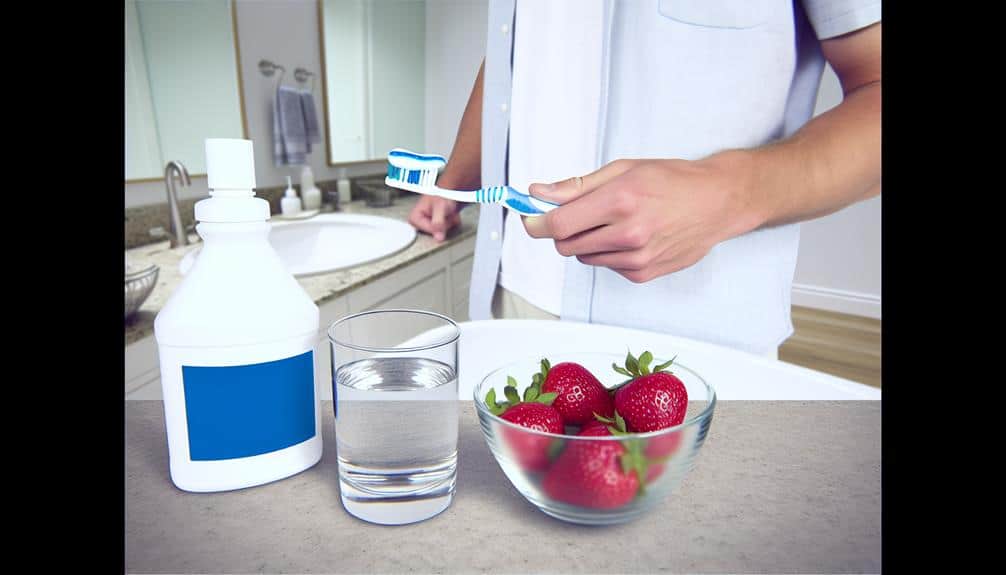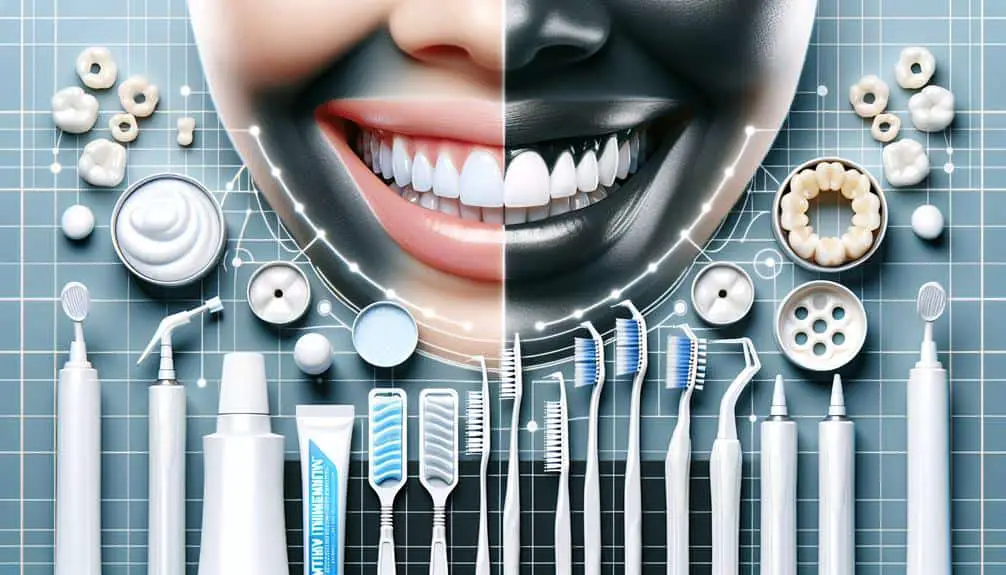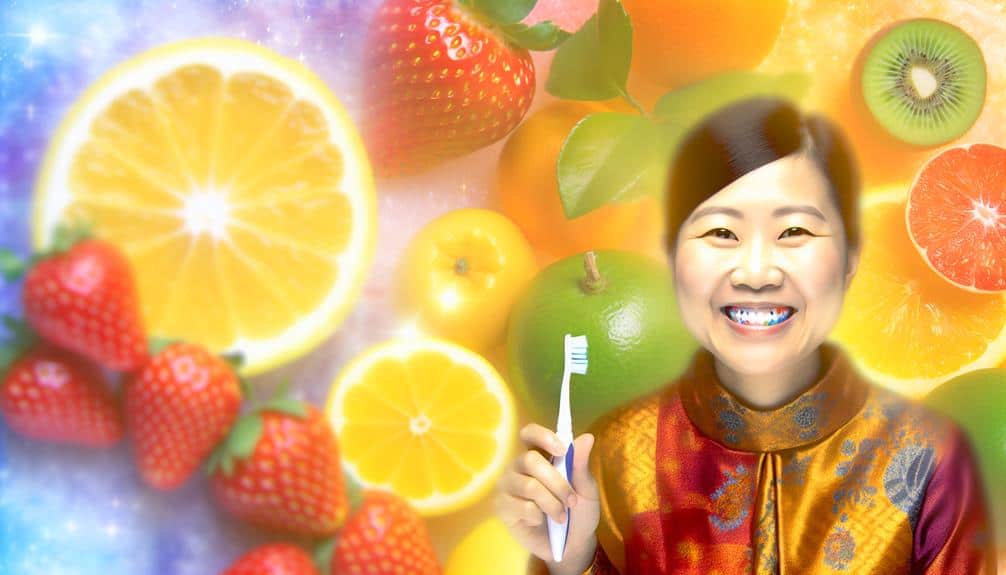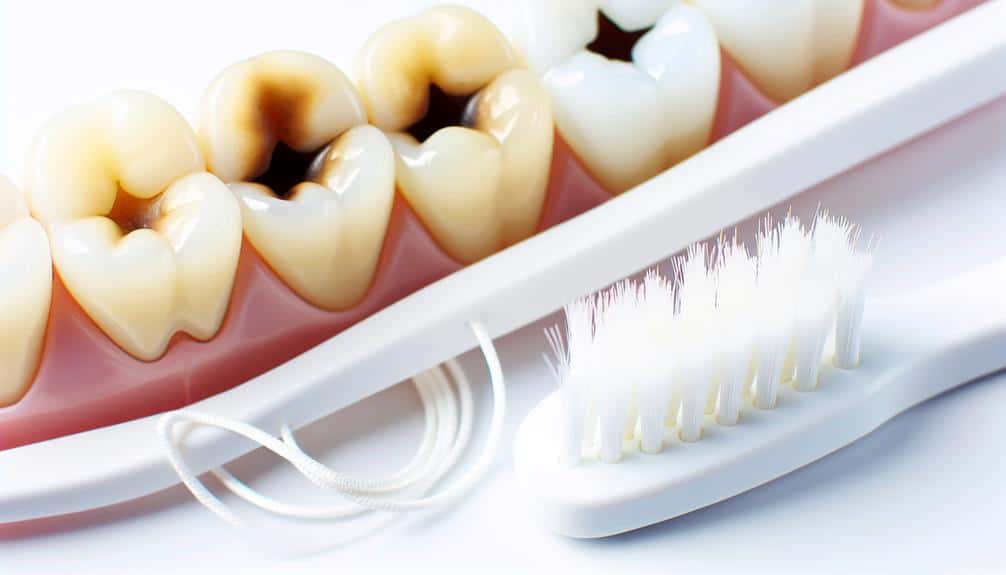To brighten discolored teeth at home, start with proper dental hygiene, like brushing and flossing regularly to remove plaque and stains. Try DIY remedies such as a baking soda paste for gentle surface stain removal or coconut oil pulling for plaque reduction. Avoid foods like coffee and habits like smoking that contribute to discoloration. Natural techniques like oil pulling can aid in whitening, while professional options from dental experts offer potent solutions for stubborn discoloration. Implementing these tips can help you achieve a brighter smile at home, ensuring a healthier and more radiant appearance.
Key Points
- Use baking soda paste to gently scrub away surface stains.
- Swish coconut oil for 15 minutes daily to aid in plaque removal.
- Limit consumption of staining foods like coffee and red wine.
- Brush with turmeric powder to reduce stains over time.
- Maintain proper dental hygiene with regular brushing and flossing.
Causes of Tooth Discoloration
Tooth discoloration can be caused by various factors such as food and beverages, smoking, and poor oral hygiene. Essential measures are vital to maintaining a bright smile. Proper dental hygiene is the cornerstone of preventing tooth discoloration. Regular brushing and flossing help remove plaque and stain-causing substances before they can adhere to the teeth. Visiting your dentist for routine check-ups and cleanings is also indispensable in preventing discoloration, as professional cleanings can remove stubborn stains and tartar buildup.
In addition to maintaining good oral hygiene practices, being mindful of your diet can help prevent tooth discoloration. Limiting the consumption of dark-colored foods and beverages such as coffee, tea, and red wine can help prevent stains from developing on the teeth. If you do indulge in these items, consider rinsing your mouth with water afterward to help minimize their staining effects. By taking these essential measures and prioritizing dental hygiene, you can help keep your smile bright and free of discoloration.
DIY Teeth Whitening Remedies
Considering various natural ingredients that have been shown to help whiten teeth can be a cost-effective way to enhance your smile at home. Here are some DIY teeth whitening remedies you can try:
- Lemon Juice Method: The acidity in lemon juice can help remove stains on the teeth. Mix lemon juice with water and use it as a mouthwash, but be cautious as frequent use can erode tooth enamel.
- Baking Soda Paste: Baking soda is mildly abrasive and can scrub away surface stains. Mix baking soda with water to form a paste, then brush your teeth gently with it.
- Coconut Oil Pulling: Swishing coconut oil in your mouth for about 15 minutes daily can help remove plaque and bacteria, leading to a brighter smile.
- Turmeric Powder Brush: Although it seems counterintuitive due to its yellow color, turmeric powder has natural whitening properties. Brushing your teeth with a damp toothbrush dipped in turmeric powder can help reduce stains over time.
Foods and Habits to Avoid
When aiming for a brighter smile, it's essential to be mindful of certain foods and habits that can contribute to teeth discoloration and affect your oral health. Staining culprits such as coffee, tea, red wine, and dark berries can lead to surface stains on your teeth over time. Additionally, acidic foods like citrus fruits and vinegar can erode the enamel, making teeth more susceptible to discoloration.
To prevent discoloration, it's advisable to limit the consumption of these staining culprits. If you do indulge in them, consider using a straw to minimize contact with your teeth or rinse your mouth with water afterward. Smoking is another habit to avoid as it not only stains teeth but also harms overall oral health.
Maintaining good oral hygiene practices, such as brushing and flossing regularly, along with routine dental check-ups, can help prevent and address teeth discoloration caused by these foods and habits. By being mindful of what you consume and how you care for your teeth, you can take proactive steps in preserving a brighter, healthier smile.
Natural Teeth Brightening Techniques
Enhance the brightness of your smile with natural techniques that promote teeth whitening in a safe and effective manner. When it comes to brightening discolored teeth at home, consider the following evidence-based tips:
- Oil Pulling: This ancient practice involves swishing oil around in your mouth to remove bacteria, which may help whiten teeth. While some studies suggest oil pulling can reduce harmful bacteria in the mouth, its whitening effects aren't well-supported.
- Turmeric Paste: Turmeric, known for its anti-inflammatory properties, is sometimes used to create a paste for teeth whitening. However, its effectiveness in notably whitening teeth is limited and may stain gums.
- Baking Soda: A common ingredient in DIY toothpaste, baking soda can help scrub away surface stains. Yet, it should be used cautiously as it can be abrasive and lead to enamel damage over time.
- Apple Cider Vinegar: While some claim it whitens teeth, apple cider vinegar's high acidity can erode tooth enamel. It should be used sparingly and always diluted.
Professional Whitening Options
Explore effective professional whitening options to achieve a brighter and whiter smile with long-lasting results. In-office treatments conducted by dental professionals offer a potent solution for stubborn discoloration. These procedures involve the application of high-concentration bleaching agents that can greatly lighten the color of your teeth in just one session. The advantage of in-office treatments is the immediate and noticeable results they provide, making them ideal for individuals seeking rapid improvements.
Alternatively, whitening products prescribed by dentists for home use can also be highly effective. These products typically include custom-fitted trays and professional-grade bleaching gel. By following the dentist's instructions diligently, you can achieve impressive results within a few weeks. While at-home whitening may take longer to show visible changes compared to in-office treatments, it's a convenient and cost-effective option for those with mild to moderate tooth discoloration.
Choosing between in-office treatments and at-home whitening products depends on your preferences, budget, and the severity of discoloration. Consulting with your dentist can help determine the most suitable professional whitening option for your specific needs.
Frequently Asked Questions
Can Tooth Discoloration Be a Sign of a More Serious Dental Issue?
You may overlook, but tooth discoloration could signal more than a cosmetic concern. It's a window into your dental health. Regular check-ups, impeccable oral hygiene, and timely intervention can prevent potential serious issues.
How Often Should I Be Whitening My Teeth at Home to See Noticeable Results?
To see noticeable results when whitening your teeth at home, aim to whiten them every 1-2 months. Consistent whitening sessions can enhance effectiveness. Home remedies like baking soda or hydrogen peroxide can also help achieve desired results.
Are There Any Specific Toothpastes or Mouthwashes That Can Help With Tooth Discoloration?
For brightening discolored teeth at home, consider using whitening toothpaste and mouthwash. These products can help combat tooth discoloration effectively. Incorporating them into your daily routine can be a simple yet effective DIY remedy for brighter, whiter teeth.
Is It Possible to Over-Whiten Your Teeth at Home, and What Are the Dangers of Doing So?
Yes, over-whitening teeth at home is possible. Risks include gum irritation, tooth sensitivity, and enamel damage. Safety concerns include using DIY methods excessively. Balance is key; consult a dentist for guidance on effective, safe home remedies.
Are There Any Long-Term Effects of Using Natural Teeth Brightening Techniques Over Professional Whitening Options?
When contemplating natural remedies for teeth whitening, it is crucial to weigh effectiveness against risks. DIY methods may lack professional oversight, potentially leading to long-term damage. Professional whitening offers safer and more controlled outcomes.



